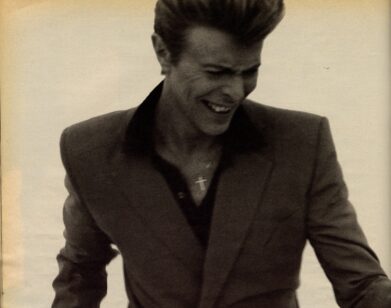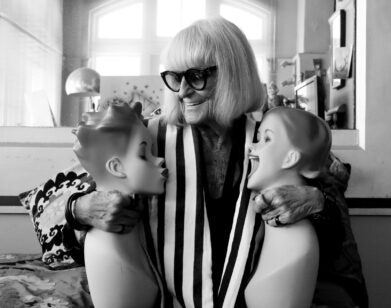Margaret Trudeau Has the Last Laugh in Certain Woman of an Age
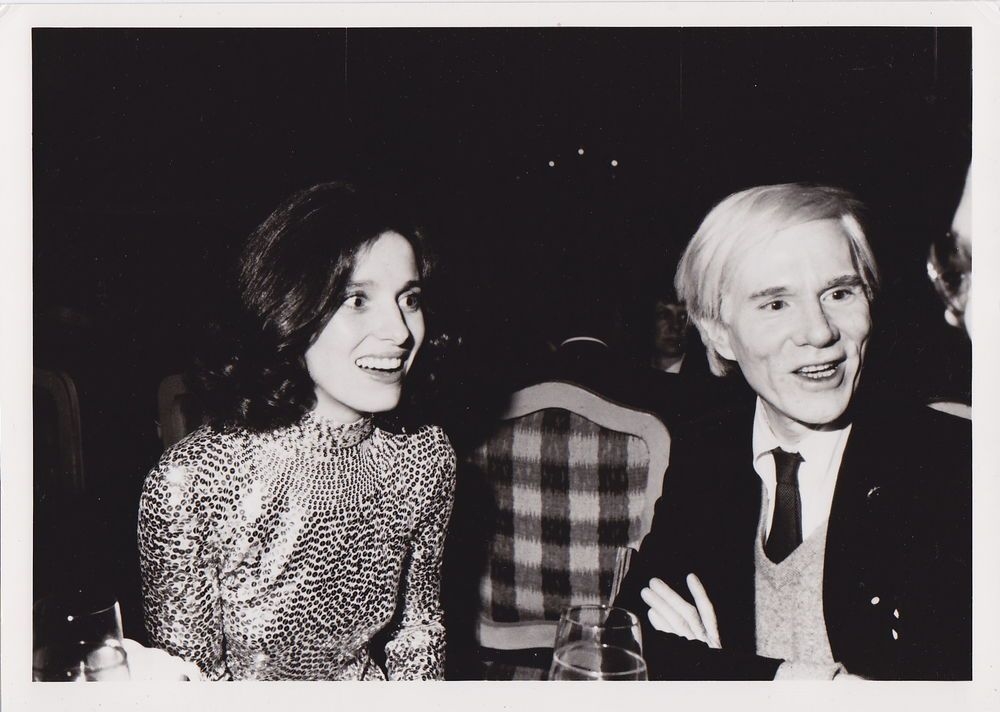
Andy Warhol with Margaret Trudeau at ”Le Club” NYC in 1979. Photo by Stephen Shore.
Margaret Trudeau was the quintessential wild child of the 1970s—a self-professed “hippie dippy” who hung out with Andy Warhol at Studio 54 and ran off with the Rolling Stones while babysitters watched her children. (Not to mention her affair with Jack Nicholson.) But Trudeau wasn’t just any pretty face on the dance floor; she was the first lady of Canada. In 1971, she married Pierre Trudeau, a man 29 years her senior who served as the country’s prime minister from 1968 to 1979, and again from 1980 to 1984. She had three sons with Trudeau, one of whom, Justin Trudeau, is the current prime minister—making her the first Canadian woman ever to be the wife of a prime minister, then the mother of one.
Though she’s now based in Montreal, having authored several books and championed mental health advocacy, she’s returned to her old stomping grounds this week with her one-woman show A Certain Woman of An Age, which runs at the Minetta Lane Theater from September 12 to 14. It’s an autobiographical romp through some of the most colorful—and devastating—moments of her life, from being the center of tabloid fodder to life as a first lady; she touches on her dream of acting, befriending the Queen of England, learning she has bipolar disorder, and her son Michel’s death in 1998. Though the show isn’t stand up per se, it does have plenty of laughs. As Trudeau says, “If you don’t learn how to laugh at yourself, you’ll be depressed.” (Don’t worry; if you can’t make the stage show, it’ll be available online at Audible Theater.) For our interview, Trudeau brought a copy of Interview from 1978, on which she graced the cover. We spoke about channeling mental illness in comedy, being a mom to the handsome Justin, and running away with the Rolling Stones.
———
NADJA SAYEJ: You brought a copy of Interview! You have a long relationship with the magazine, right?
MARGARET TRUDEAU: A long history. This cover was from March 1978. For this cover, my son [Justin Trudeau] told me: “Mom, this is the first time your nose was ever Photoshopped!”
SAYEJ: They changed your nose?
TRUDEAU: Well look, my nose has a bump in it. It doesn’t have one there.
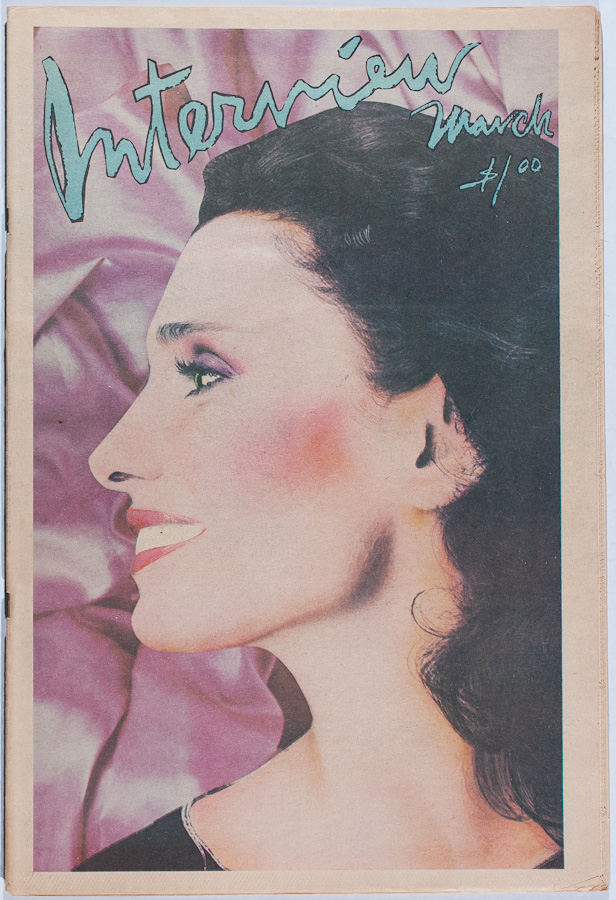
Margaret Trudeau on the cover of Interview in March 1978.
SAYEJ: It’s so great you’re now doing a stage show called A Certain Woman of An Age and embarking on… comedy?
TRUDEAU: [Laughs.]
SAYEJ: There’s such a thin line between comedy and tragedy and you’ve found a way to make art out of difficulty.
TRUDEAU: You know what I find? I realized when I was getting well that we have a choice: We can be happy, make fun of ourselves and others and laugh, or we can be deadly, judgmental, and mean spirited to ourselves, which is a part of depression and a part of mental unwell-ness. It takes the brain five years to heal itself after a big trauma, so after the loss of my son—and this is one of the stories in my play—laughter came back into my life in a huge way. I started to find myself filled up with joy instead of sorrow. I recommend laughing. I was always worried and concerned and my doctor asked me, “What do you do before you go to bed?” I said, “I sit down and watch the news.” He told me if I watch the news at 8 a.m., I might be able to do something to change one of those stories. There’s nothing you can do at 8 p.m., so switch to comedy. Laugh. So, I became a late-night laugher, a belly laugh before I sleep because laughing does release you in a way that’s just a gift.
SAYEJ: It’s the best medicine, right?
TRUDEAU: I’ve always liked comedy and told jokes. I like making people laugh, but I don’t think of myself as a comedian. What I am is a mental health advocate. I’m quite serious about changing people’s minds so that they’ll accept that mental health is an illness like any other. It’s part of our body and mind, it’s part of us. If we don’t seek treatment, we won’t recover. We’ll stay mentally ill forever. Mental illness takes you away from the present. I did this show at Just for Laughs in Montreal, too. Their marquee had, in huge letters, Trevor Noah, and then at the bottom among 20 other names, my name. People couldn’t figure it out, yet everyone in Canada knows who I am. ‘What is she doing at a comedy show?’ My show was terribly successful and sold out. People laughed very hard.
SAYEJ: You said your goal is to shatter the conventions around what a play is.
TRUDEAU: Yes, murder the pretentiousness. I’m just telling the truth. This is no play. This isn’t thought up witticisms, this is all my words. I had the blessing of working with Alix Sobler, who is a brilliant script writer, and the director Kimberly Senior. I have been giving this speech for 13 years, but it was always beginning, middle, and end. But Alix came along and spun my words around and made them into a way that gets the audience active to make it not a lecture, but a story. We want people to understand I’m not here to fool you. This is the truth.
SAYEJ: I found a quote from the play where you say, “You know what prepares you for a mental hospital? Being a first lady.”
TRUDEAU: There are five ways that living in a mental hospital is like living as a first lady at 24 Sussex. We use the number five quite a bit and I hand out five questions to the audience. It’s interactive. I’m not telling you any of the details, but our choices change our lives. The way we make choices at one point and then make choices at other moments—like, why did I run off with the Rolling Stones?
SAYEJ: Why did you run off with the Rolling Stones?
TRUDEAU: It was a symptom of bipolar disorder that I got to run away with the Rolling Stones. Someone else in my condition would just run away with someone from the 7-11. But we would run away, that’s the bottom line. I was just in a fancy circle.
SAYEJ: Are you the first mental health advocate in Canada?
TRUDEAU: Yes, I crossed paths with Ron Ellis, a Hall of Fame Toronto Maple Leafs hockey player who talked about his depression, saying he would go in solitude after hockey games and just cry. Now, so many are talking about it and they have the courage to help so others realize they’re not alone. More of us must tell our story. Everyone who has gone through mental illness and come through the other side must tell their story to others. It gives you hope and the chance to know you’re not going to stay in this gray cloud visiting you again and again. You’ve got it under control.
SAYEJ: How did it feel to do that?
TRUDEAU: I don’t know, I just did it. When you think about Betty Ford and her alcohol abuse … again, people have tried in different ways to help people, but we really haven’t had the conversation before out loud so strongly about mental illness. Nobody wants to go there.
SAYEJ: I’ve seen photos of you and Andy Warhol walking, talking, dining … it seems like you had a nice friendship.
TRUDEAU: We did. He was the most brilliant artist and he was so curious, like a child. We’d go to Studio 54 and he’d have his little brownie camera strapped around his neck. He’s say, “Oh gee, look” and point to something outrageous at the club. He was a very gentle man. He wasn’t a man of a lot of words, but I liked that. I was comfortable with Andy. We first met in Japan, oddly enough. We sat next to each other at a Buddhist temple where we had the most inedible vegetarian lunch and we both were going “Huh?” He was just a catalyst for getting a lot of people for lunch together. It was a great period in my life. I loved Andy, I liked being at his side. He showed me a different way to look at the world, and it wasn’t words. It was visually, with color and light.
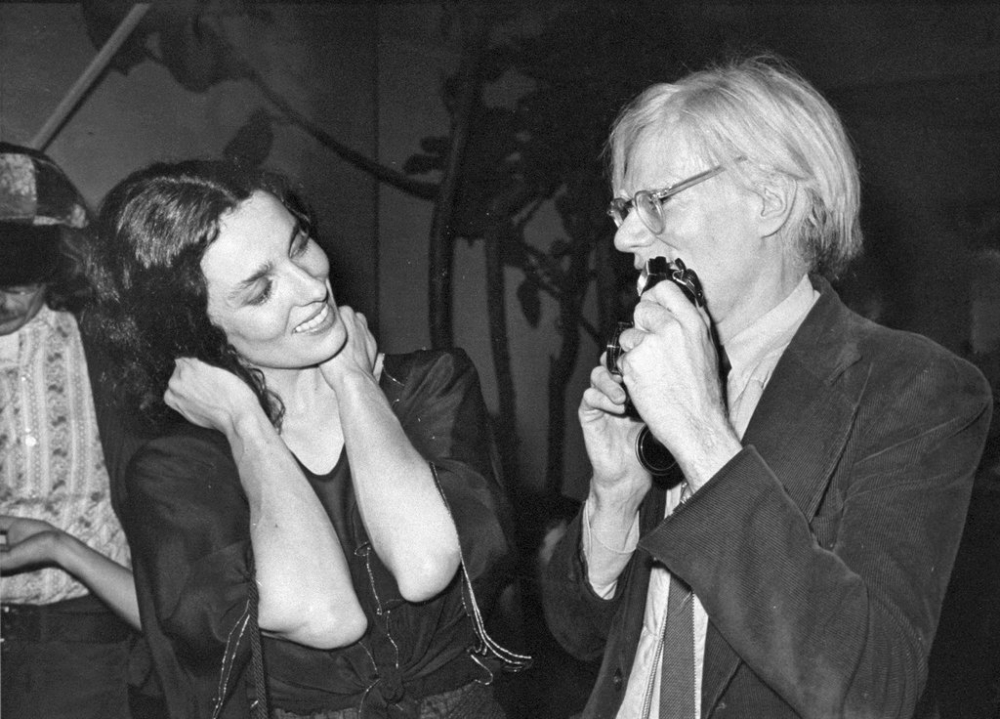
Andy Warhol takes a picture of Margaret Trudeau dancing at Studio 54 in 1978. Photo by Adam Scull-PHOTOlink/MediaPunch.
SAYEJ: I was reading your first book Beyond Reason, and it was such an incredible journey.
TRUDEAU: I was so young, and I don’t talk about being in a psychiatric hospital until page 217, and the book is 230 pages. The awareness was bubbling but there was no understanding. Consequences, my next book, I was blaming everyone else for everything, pretending I wasn’t crazy. Our lives have a trajectory, we have a path. That path isn’t always clear to us at times and we take wrong turns, we get off our path. But I believe when we do get back on our path, we have to have a certain amount of humility, and recognize that making mistakes is one of our biggest learning curves. Humiliation or when we’ve done something wrong is when we really grow inside—when we get caught.
SAYEJ: Your biggest dream initially was to become an actress, right?
TRUDEAU: I know, I read back in my high school yearbook that I wanted to be a foreign correspondent, but I also wanted to be an actress. I studied in New York at the American Place Theatre for two years. I used my acting skills to hide my true feelings—that’s what we do with mental illness, we put on a mask. Mine was a well-honed mask. I could change in a second from being in the depths of despair to “oh hello!” too easy. Taking off the mask is the difficult part.
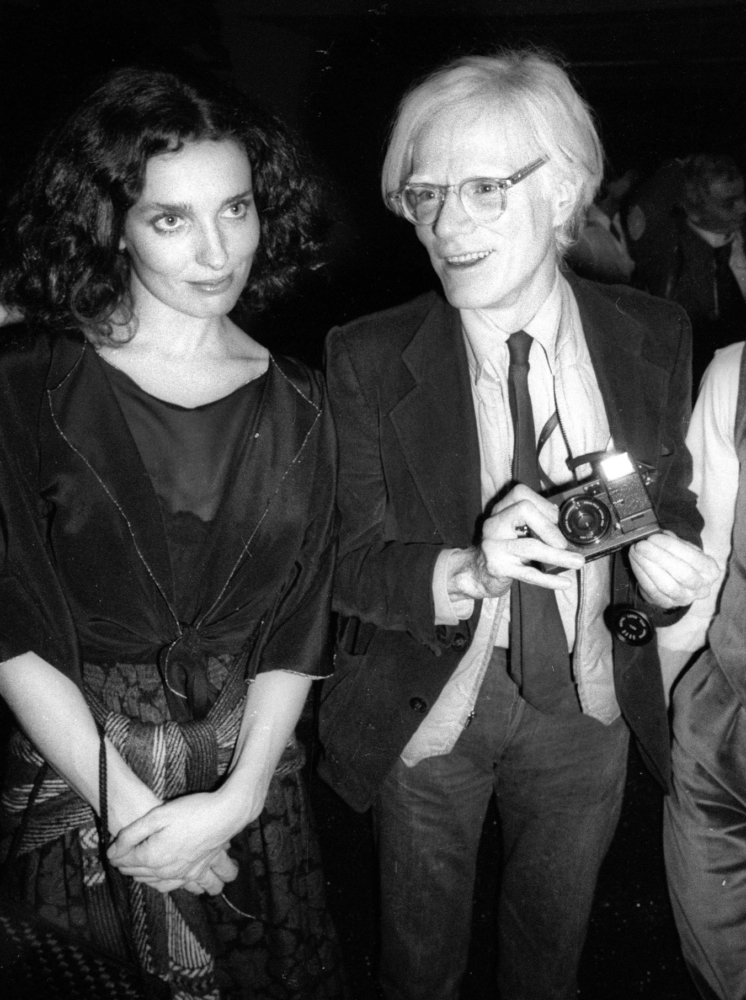
Margaret and Andy. Photo by Adam Scull-PHOTOlink.net.
SAYEJ: What’s it like being Justin Trudeau’s mom? Everyone loves to talk about how good-looking he is.
TRUDEAU: Yes, well, he wouldn’t be the prime minister of Canada if he was just a pretty face. Justin is brilliant and one of the kindest people I’ve known. I look at him as my son, completely mummy’s gaze. I’m so proud of him, I think he represents our country so well. I think he represents, when you see him on the world stage, the hope of the younger generation, as opposed to the older ones clinging onto power. He is forward-thinking. When you look at refugees, climate change, and immigration, he’s in the right place.
I had to battle so hard to get balance in my life—that’s part of being well with bipolar—knowing when to work, when to play and sleep. Justin’s father was balanced, and we raised them to be balanced children. I saw Justin the other day and he doesn’t have a grey hair or a wrinkle. He only gets one day a week to have family life, but boy, is he inside it. That fuels us to be good workers. That whole idea of being a workaholic, of working all the time, is not good. You’ll be less effective. You’re too tired, you’re distracted. You get fed by doing nothing, by being with your kids, going outside.
SAYEJ: Was he always charming growing up?
TRUDEAU: Oh darling, yes. Always. Voracious reader. The first book I gave him … When he was 11, he was so tired of all the books I was giving him: “Mummy can I please read a big book?” I thought about it and finally gave him a big book. He disappeared for the weekend. He came out of his room bleary-eyed and said, “Mummy all those years I was growing up, seeing all the books in the library, I didn’t know what worlds are inside them.” I had given him Gone With The Wind. It was to open his eyes to the huge epicness of what a story can tell and how you can get swept away into it.
SAYEJ: Whenever I see photos of you two together, Justin always seems affectionate towards you.
TRUDEAU: Oh, he better be! [Makes kissing noises]. I love all my children. I had five and I have a different relationship to all of them. We didn’t raise them with expectation but with empathy. Which means my kid isn’t going to be a doctor or a lawyer, but my little boy is going to be the best of what he’s good at. To let them grow in what they love doing, not make them do what they think they must do.
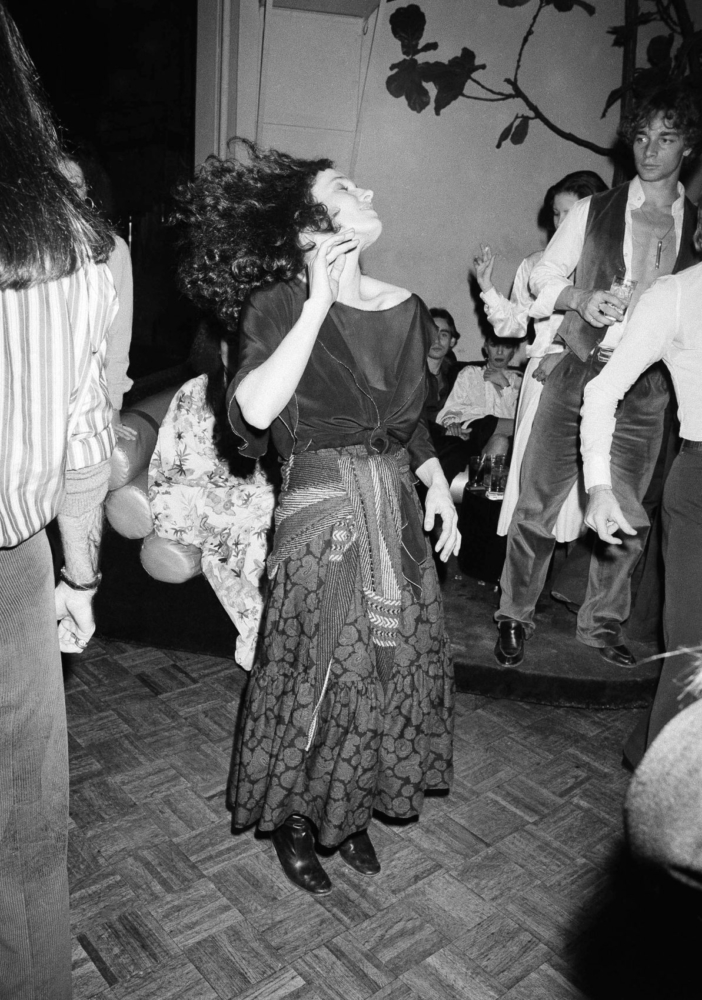
January 17, 1978: Margaret Trudeau dancing at Studio 54. Photo by AP Photo/Richard Drew.
SAYEJ: And now your stage show is touring Toronto, Stratford and Athens. Did you think this would happen?
TRUDEAU: No, it just started four nights onstage at Second City. I never thought of all this.
SAYEJ: It has taken people so long to talk about mental illness.
TRUDEAU: It’s also about right place right time, because we’re all having this conversation. From the top of the government down—some with complete ignorance of what it means, others with a deep understanding . I want to get people talking out of their ignorance and fear and into normalizing and understanding that not all of us are the same, and we’re certainly not robots. We do have feelings. I saw a good phrase I saw on a t-shirt: “I don’t want feelings, I just want new clothes.”
SAYEJ: What does that mean to you?
TRUDEAU: Feelings are a lot of work; clothes are immediate gratification. Then you need more gratification. Feelings take hard work, it’s a battle. A life unexamined is not a worthy life. You have to know yourself, your edges, your limits. That’s the strength I got out of all my therapy. Finally knowing when enough is enough, when to exit, how to make my choices, to be clear. That’s because someone was able to take my hand, with a clear mind, and get me there.
SAYEJ: They’re calling your show “a survivor’s tale.”
TRUDEAU: Yeah, it is.
SAYEJ: Will you always be a flower child at heart?
TRUDEAU: Mmhmm. I was offended by one of the reviews in The Globe and Mail, where the writer said: “She’s still slightly dippy.” I thought, you’re missing a word. Don’t just call me dippy. Call me hippie dippy! I’m never losing my flower child—that’s who I am. Love, peace, happiness. I’ll always be against suits and corporations, globalization, because I’m always on the side of the human, the person, the real thing. I still have a lot of growing to do—don’t we all? Things seem kind of crazy right now. I like the idea of me, at this stage of my life right now, being beyond politics, all that protocol. I like being in the theatre world and being around these creative, young feminists who take no nonsense. It’s clear.
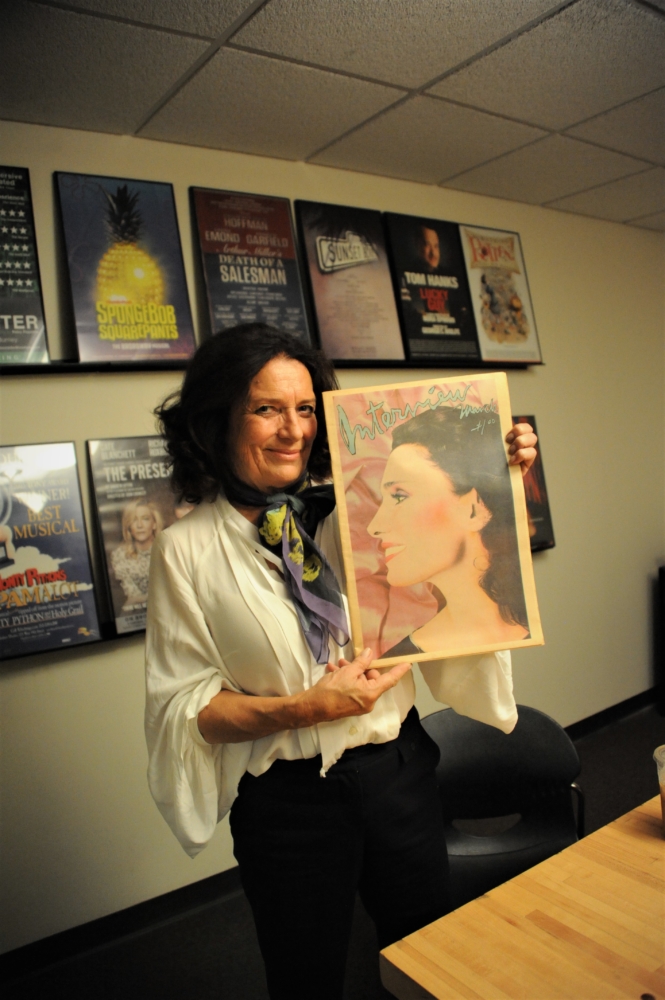
Margaret and Margaret. Photo by Nadja Sayej.

